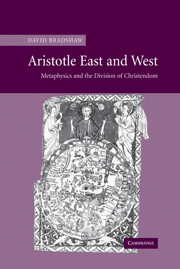Book contents
- Frontmatter
- Contents
- Preface
- 1 The Aristotelian beginnings
- 2 The Prime Mover
- 3 Between Aristotle and Plotinus
- 4 Plotinus and the theory of two acts
- 5 The Plotinian heritage in the West
- 6 Gods, demons, and theurgy
- 7 The formation of the eastern tradition
- 8 The flowering of the eastern tradition
- 9 Palamas and Aquinas
- 10 Epilogue
- Bibliography
- Index
3 - Between Aristotle and Plotinus
Published online by Cambridge University Press: 22 September 2009
- Frontmatter
- Contents
- Preface
- 1 The Aristotelian beginnings
- 2 The Prime Mover
- 3 Between Aristotle and Plotinus
- 4 Plotinus and the theory of two acts
- 5 The Plotinian heritage in the West
- 6 Gods, demons, and theurgy
- 7 The formation of the eastern tradition
- 8 The flowering of the eastern tradition
- 9 Palamas and Aquinas
- 10 Epilogue
- Bibliography
- Index
Summary
The story of the diffusion of Aristotelianism during the centuries after Aristotle's death is a long and tangled one. The works making up the Corpus Aristotelicum as we know it seem to have originated as notes written for lectures to students in the Lyceum. Aristotle also wrote a number of more popular works, the so-called “exoteric” writings which today survive only in fragments. Among these is the Protrepticus, whose treatment of energeia was discussed in Chapter 1. There is general agreement that the exoteric works were in circulation during the Hellenistic period, and that as late as the second century a.d. they still formed the main basis for the educated public's understanding of Aristotle. The fate of the school treatises is more obscure. According to a story told by Strabo and Plutarch, “Aristotle's books” passed at his death into the hands of Theophrastus, Aristotle's student and colleague, and the second head of the Lyceum. Theophrastus in turn bequeathed them to Neleus of Skepsis, who removed them to his hometown. There they languished in obscurity until they were recovered toward the end of the second century b.c. by Apellicon, a bibliophile who brought them to Athens. He published a faulty and apparently little noticed edition. Finally, about the middle of the first century b.c., a corrected edition was published by a professional Aristotelian scholar named Andronicus of Rhodes. All subsequent manuscripts of the school treatises ultimately rely on this Andronican edition.
- Type
- Chapter
- Information
- Aristotle East and WestMetaphysics and the Division of Christendom, pp. 45 - 72Publisher: Cambridge University PressPrint publication year: 2004



